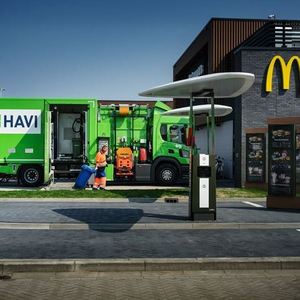Circular-economy partnership formed in the Netherlands

Photo: Neste Corp.
June 25, 2020
BY Ron Kotrba
Renewable diesel producer Neste Corp. announced a circular-economy partnership June 24 with McDonald’s Netherlands and HAVI, a global supply chain company. Used cooking oil (UCO) from McDonald’s Netherlands will be turned into renewable diesel by Neste at its plant in Rotterdam, and then the fuel will be used to power HAVI trucks that both collect UCO from and deliver goods to McDonald’s restaurants in the Netherlands.
“We are big enough to make a difference,” said Jeroen Dekkers, head of the McDonald’s Netherlands supply chain. “Circularity and reducing waste are one of the pillars of our ongoing sustainability program.”
Neste has been active in the Netherlands since 2011 when the Rotterdam biorefinery began operating. Last year, Neste opened a new office in Hoofddorp, near Amsterdam, which serves as the global hub for its renewable aviation business. Its renewable diesel has been available in the Dutch market since October and can be found at more than 90 locations throughout the Netherlands.
Advertisement
Advertisement
Related Stories
Neste and DHL Express have strengthened their collaboration with the supply of 7,400 tons (9.5 million liters) of neat, i.e. unblended, Neste MY Sustainable Aviation Fuel to DHL Express at Singapore Changi Airport starting July 2025.
CoBank’s latest quarterly research report, released July 10, highlights current uncertainty around the implementation of three biofuel policies, RFS RVOs, small refinery exemptions (SREs) and the 45Z clean fuels production tax credit.
The USDA significantly increased its estimate for 2025-’26 soybean oil use in biofuel production in its latest World Agricultural Supply and Demand Estimates report, released July 11. The outlook for soybean production was revised down.
The U.S. Energy Information Administration maintained its forecast for 2025 and 2026 biodiesel, renewable diesel and sustainable aviation fuel (SAF) production in its latest Short-Term Energy Outlook, released July 8.
XCF Global Inc. on July 10 shared its strategic plan to invest close to $1 billion in developing a network of SAF production facilities, expanding its U.S. footprint, and advancing its international growth strategy.
Upcoming Events










